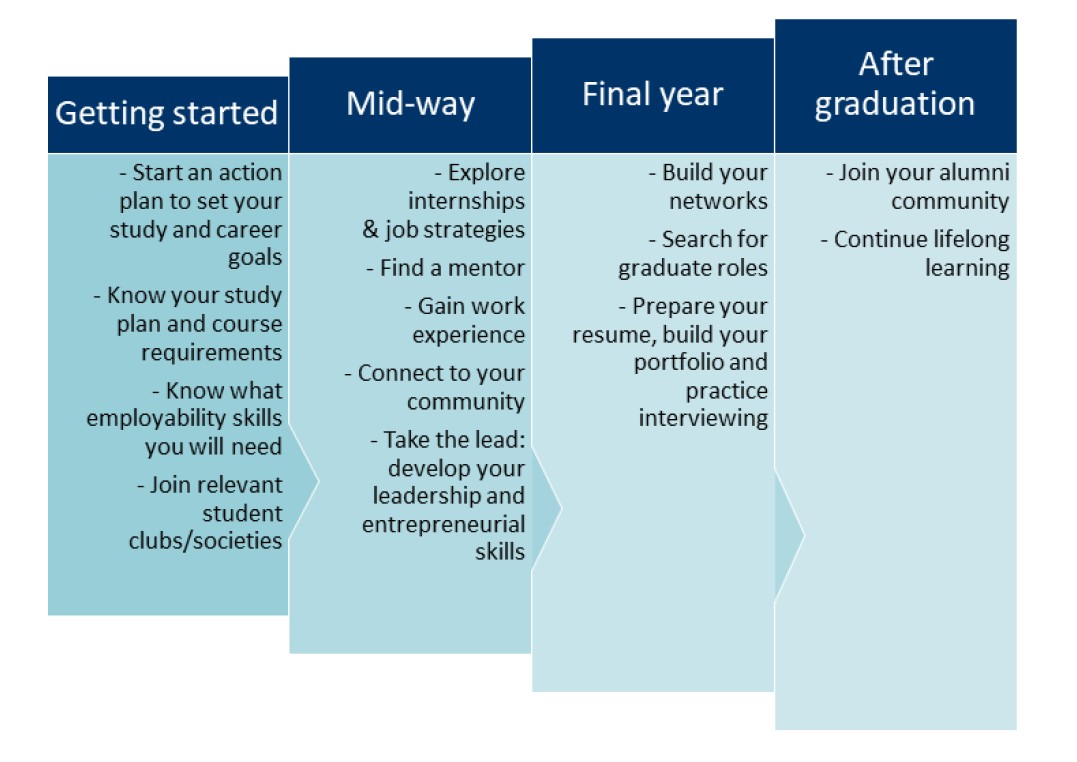Starting your career development journey
While students may think employment is something to think of at the end of their course but this is not the case.
Career development is about taking an active role in shaping one's future, by gaining the knowledge and skills necessary to be successful in a chosen profession and making connections with professionals in the field.
There are many reasons why people take up study. Whether you are a recent school-leaver, returning to study to upskill or making a career change understanding the career development journey is also an important lifelong skill.
Now that you have enrolled in your chosen course here are some steps to consider as your studies progress.
Figure 1: Career development steps for current students

Source: Adapted from UWA
In Figure 1 the career development journey has a list of tasks of activities you may wish to consider preparing for graduate employment. Here is some further information on strategies you can take across each step.
Getting started
At the beginning of your studies make an action plan to set out your study and career goals. These will include:
- making sure you understand your study plan and course requirements
- understanding the key employability skills (e.g., communication, teamwork, digital literacy, planning etc) you will need in the future
- participating in activities like joining clubs and societies that align with your interests and career goals. For example, Engineers without Borders, science clubs, debating clubs, sports clubs etc.
Mid-way through your studies
You should be exploring a range of opportunities to develop your skills and experience while you study such as:
- pursuing work integrated learning, internships and job strategies
- attending job fairs and events held by your education provider
- finding a mentor
- taking the lead in a group, project, club or committee
- volunteering with a local community group
And if you are already employed explore opportunities to extend yourself at work such as a leadership role.
Final year
In your final year continue to develop your skills, experience and networks. You can also start looking at graduate employment opportunities and other key activities such as:
- continuing to build your networks
- searching your careers service job boards and graduate recruitment programs
- building up your resume, LinkedIn profile and practice interviewing
- exploring external employment services and programs such as registering with Disability Employment Services
If you are at an eligible education provider you may want to consider the USEP or TSEP programs.
Top tips for students to develop their professional identity
Studying can be hard and you may feel it takes up all your time and energy. You are probably also trying maintain some work/life balance too.
However, consider setting aside regular time to think about employment. Some key tips include:
- Connect with your education provider’s careers services. These services often include things like a jobs board for part-time employment and graduate opportunities, tips on writing good job applications and LinkedIn profiles, invitations to jobs markets and industry events relating to your field of study, guest speaker and networking events, and access to peer mentoring programs. There may also be additional programs and services inside your education provider, or externally, to support students with disability into the workforce
- Create or update your resume regularly. Research the best options for presenting yourself on paper and/or LinkedIn and keep your resume up-to-date. You can often talk to your careers service for tips and use their resume-checker or similar supports and services
- Develop an ‘elevator pitch’. How would you describe yourself to someone in 2 minutes at an event or a chance meeting. Get used to describing who you are and what roles or goals you have. This may include choosing to disclose your disability. If you do, what are you happy sharing, what are the unique skills you bring to a potential role because of your disability?
- Develop your portfolio. A portfolio might include any artifacts from your studies and activities that you can add to a resume or job application as evidence or examples of your abilities. This could include membership to particular clubs or groups, work product from learning activities or assessment (e.g., creative works, digital works, research papers, project plans etc), certificates of achievement, additional qualifications or certifications relating to safety, extra-curricular courses in diversity training, course completions or volunteer work. Think about the employability skills you are wanting to demonstrate.
- Grab opportunities when they present themselves. Don’t be afraid to try something new to test it out, to see if you like it, to make connections. But don't overlook existing part-time work, work integrated learning or work placements, volunteer activities and existing connections such as family or friends.
For more information
Find out about employment programs and services.

